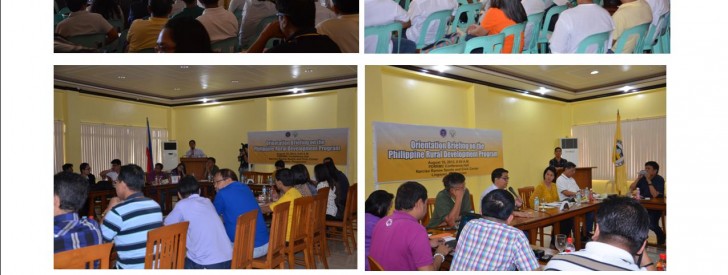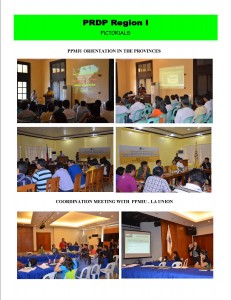
DA-Ilocos all set to the Philippine Rural Development Program
The Department of Agriculture – Regional Office I (DA-RFO I) is all set in meeting all requirements needed for the full implementation of the Philippine Rural Development Program (PRDP) in the Region.
The Philippine Rural Development Program is a six-year national program designed to establish the government platform for a modern, climate-smart and market-oriented agri-fishery sector. It is a P27 billion funded program that is set to benefit 80 provinces in 16 regions of the country that include the Ilocos Region.
The program aims to increase at least 5% the annual real incomes of farmer beneficiaries with a 30% increase in income of targeted beneficiaries of enterprise development; attain 7% increase in value of annual marketed output; and have a 20% increase in number of farmers & fishers with improved access to DA services.
Of the P27.535B fund of the PRDP, seventy five percent (75%) or P20.553 billion is loaned out from the World Bank; thirteen percent (13%) or P3.579 billion is from the national government counterpart; eleven percent (11%) or P3.118 billion is from the Local Government Units counterpart and one percent (1%) or P287 million is a grant from the Global Environment Facility (GEF). The PRDP is an expanded version of the Mindanao Rural Development Program (MRDP) which has been fully implemented in 2012 and is now on its second phase of implementation in Mindanao. PRDP is expected to directly benefit farmers within the covered regions during its six-year implementation cycle. The Program has four components, the I-Plan, I-Build, I-Reap and I-Support components.
The I-PLAN Component or the Investments in Agriculture and Fisheries Modernization Program (AFMP) Planning at the Local and National levels has a funding share of 3% or P789M. Its main objective is to strengthen the framework and linkages for the delivery of devolved but integrated agriculture and fishery services by the national and local government units through the institutionalization of the AFMP as the basis for the rationalization of DA plans and budgets.
The I-BUILD Component or the Intensified Building-Up of Infrastructure and Logistics for Development which has the highest funding share of 67% or P18.5B focuses on the improvement of road networks from production areas to market areas. It will also include interventions that will help increase productivity of farmers such as the development of farm-to-market roads, bridges, communal irrigation, potable water systems, post-harvest facilities, production facilities & trading posts, etc.
The I-REAP Component or Investments in Rural Enterprises and Agriculture & Fisheries Productivity has a funding share of 25% or P6.9B and focuses in enhancing productivity and increasing resiliency to climate changes of producers, smallholder and fisher groups through provision of production and marketing support, establishment & up scaling enterprises at the appropriate commodity value-chain segment and enhancing capacities of farmers in technology adoption, agri-fishery management & operation, among others.
The I-SUPPORT Component which is the Implementation Support to PRDP focuses on attaining effective and efficient management of the PRDP. Funds allocated for this component is 4% or P1.2B. Of the P27.4B total fund of the PRDP, Region I’s total allocation is P1.3B that will fund projects for a six-year implementation cycle from 2013-2018 in the region.
Under the program’s implementation structure, the Department of Agriculture is tasked to head the implementation of the project. Two advisory boards were created under the program, the National Program Advisory Board or NPAB and the Regional Program Advisory Board or RPAB. The NPAB is chaired by the DA Secretary with the President of the League of Provinces as Vice-Chair. Members are the different partnering agencies under the program which include DAR, DENR, DOST, DTI, NAPC, LCP, DSWD, DPWH, NCIP, DILG, LMP, NEDA, DBM, BFAR and NAFC.
The NPAB shall provide overall direction and oversight for project implementation and will also serve as the policy-making body. On the other hand, the RPAB is chaired by the DA Regional Executive Director and Vice-chaired by a member of the League of Provinces. Members are the Regional Directors of the different partner agencies under the program.
Offices under the NPAB are the National Program Coordination Office or NPCO (headed by the DA Office of the Undersecretary for Operations) and handles overall coordination and support, particularly in information and external communications; the Program Support Office (PSO) which is established in each regional cluster in Luzon, Visayas and Mindanao shall oversee regional cluster operations and support services. For Luzon Cluster, PSO head is Dr. Andrew Villacorta, Regional Executive Director of DA-RFO III; and the Regional Program Coordination Office (RPCO) as the key implementing unit of PRDP that ensures full play of Regional Field Units (RFUs) including mobilization of DA-related agencies. The RPCO head in Region I is Dr. Paz Mones, Regional Technical Director for Operations of DA-RFO I. Meanwhile, the RPAB will provide guidance to the RPCO. In Region I, current head of the RPAB is DA-RFO I OIC- Regional Executive Director Valentino C. Perdido. The RPAB shall also review and approve I-BUILD and I-REAP subprojects for funding endorsed by RPCO and likewise approve and endorse PRDP annual regional work and financial plan to the National Program Coordination Office.
Since the PDRDP will be implemented in partnership with LGUs and Agri-Fishery stakeholders, part of the PRDP’s implementation structure are the Provincial Program Management and Implementing Units (PPMIUs) who will directly supervise the Municipal Local Government Units, Private Organizations (POs) and Non-Government Organizations (NGOs). The PPMIUs are created through an Executive Order from the Local Chief Executive of the province. The PLGUs will be the entry point of interventions, starting with existing Provincial Development Plans.
Since 2013 is the preparatory stage for the implementation of the PRDP, Region I RPCO headed by Dr. Mones, have successfully conducted various preparatory activities in the region starting with the conduct of briefings among Local Chief Executives of the region to give them full understanding about PRDP and the creation of the PPIMUs in each of the four-provinces in the region. Following this is the identification of priority commodities in each region which will be given support through the PRDP. Region I’s identified top three priority commodities are Mango, Peanut, and Goat.
Since projects under PRDP include the use of value-chain market-oriented approach to firm up the regional and provincial AFMPs, review on the value chain and market appraisal of the identified priority commodities were conducted. Conduct of Value Chain Analysis (VCA) and the formulation of the Provincial Commodity Investment Plan (PCIP) for Mango were among the recent activities undertaken by Region I RPCO. Relevant trainings to enhance capabilities of each key players in the PRPD implementation were also conducted. With all the firming-up activities being diligently conducted through the RPCO in the region, Region I is now making a head-start among its counterpart regions under the PRDP as far as program implementation is concerned, and with the active support and participation of the provinces, the agriculture sector here is confident of achieving its goals and objectives of creating a dynamic and highly productive farmer-entrepreneurs in Region I.

